As someone with a deep connection to dogs, particularly the noble German Shepherd, I’ve always been fascinated by the intriguing blend of traits in the German Shepherd Wolf Mix. This mix is a captivating combination of the loyalty and companionship found in dogs and the wild, mysterious nature of wolves. These characteristics come together to create a truly legendary dog.
Interestingly, this hybrid dates back to the very origins of domestic dogs. It’s a journey back in time to when dogs first diverged from wolves around 100,000 years ago. Despite this long separation, they remain part of the same species and retain the ability to interbreed. The result is a breed that is not only unique in appearance but also in temperament.
In the following sections, I’ll help you discover more about this fascinating hybrid, including the care needs and what makes this mix such a special addition to the right home.
TABLE OF CONTENTS
- German Shepherd Wolf Mix Breed Summary
- Breed Origin and History of the German Shepherd Wolf Mix
- German Shepherd Wolf Mix Appearance
- German Shepherd Wolf Mix Personality and Temperament
- How to Train a German Shepherd Wolf Mix
- Caring for a German Shepherd Wolf Mix
- Feeding Guide for Your German Shepherd Wolf Mix
- Common Health Concerns for the German Shepherd Wolf Mix
- Buying a German Shepherd Wolf Mix
- FAQs on the German Shepherd Wolf Mix
- Reflecting on the German Shepherd Wolf Mix
- More German Shepherd and Wolf Mixes
German Shepherd Wolf Mix Breed Summary
| Size: | 20-26 inches |
| Weight: | 50-100+lb |
| Lifespan: | 12-14 years |
| Coat: | Double coats, medium length |
| Color: | Black and tan, sable, black, white, mottled gray, red or brown |
| Do They Shed: | Yes – two shedding seasons a year |
| Temperament: | Mischievous, playful, loyal and reserved |
| Intelligence: | Intelligent |
| Socialization: | Unpredictable around other dogs, will need a lot of early socialization |
| Destructive Behavior: | Loves to howl at anything and will chew when bored |
| People Skills: | Can be shy and reserved around strangers |
| Good with Children: | Not good with small kids |
| Activity Levels: | Very energetic, will need at least 1-2 hours of exercise |
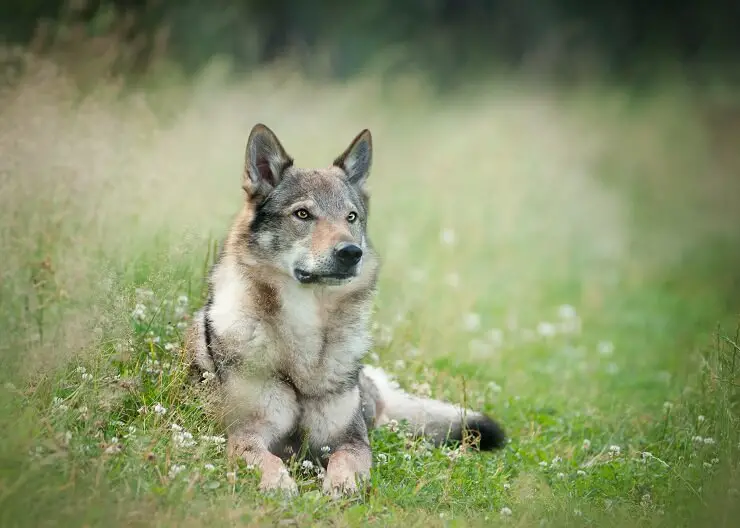
From Adobe Stock
Breed Origin and History of the German Shepherd Wolf Mix
So, what is a German Shepherd Wolf Mix? As the name suggests, this mix is made up of a German Shepherd and a Wolf. These hybrids (crossbreeds) are often called Wolfdogs or Wolf-Shepherds.
Whilst there are many types of German Shepherd Wolf mixes, the Saarloos Wolfhund is the most notable. They were created by Leendert Saarloos back in 1935 when he crossbred a German Shepherd with a Eurasian Wolf. The aim of this cross-breeding was to bring back the natural traits the GSD had lost when domesticated.
Other common types include the Czechoslovakian Wolfdog, the Kunming Wolfdog (Chinese), and the Lupo Italiano (Italy).
The UK Kennel Club, but not the American Kennel Club, recognizes the German Shepherd Wolf Mix. You should also keep in mind that they are illegal in several areas across the US, so do your research before keeping one.
Let us first understand the parent breeds.
German Shepherd
They originally came from Germany in the late 19th Century and were bred for herding sheep and providing protection. Captain Max von Stephanitz is the person we credit with developing this breed, and he had a clear goal: to create highly intelligent and capable working dogs.
Over time, German Shepherds became incredibly popular because of their versatility. They found roles in law enforcement, the military, and as service dogs. Physically, they’re strong and have a distinctive black and tan coat, although you can find them in other colors too. These dogs usually weigh between 50 and 90 pounds and stand about 22 to 26 inches tall at the shoulder.
What really stands out about German Shepherds is their intelligence, loyalty, and protective instincts. To keep them happy and healthy, they need regular exercise and mental stimulation. On average, they live for about 9 to 13 years. Due to their excellent guarding skills and intelligence, they often undergo training for a variety of important roles in our communities.
Wolf
Let’s talk about wolves – these amazing creatures are native to Eurasia and North America. They’re actually the biggest members of the canine family. Adult males usually weigh between 70 and 145 pounds, while females are a bit smaller. Wolves have thick fur, and their colors can range from white, gray, brown, to black. What’s really interesting is that they’re super social animals and often live and hunt together in groups called packs.
Did you know that wolf packs are usually led by an alpha male and female? It’s like they have their own little family hierarchy. And when it comes to chatting with each other, wolves are pretty sophisticated. They use a mix of howls, barks, and body language to talk. Pretty cool, right?
Wolves are also top-notch hunters. They mostly hunt big animals like deer, but they’re not picky eaters and can adapt their diet when they need to. In the wild, wolves usually live for about 6 to 8 years, but if they’re in a place like a zoo, they can live up to 13 years. That’s quite a difference!
German Shepherd Wolf Mix Appearance
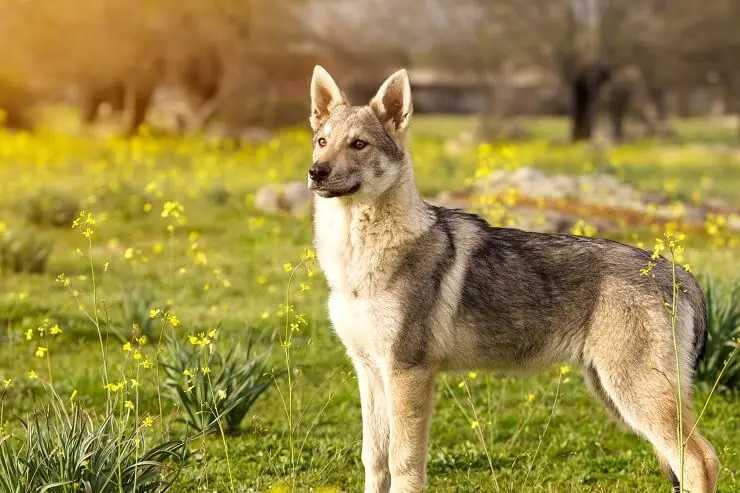
From Adobe Stock
There is no doubt that the German Shepherd Wolf mix is absolutely stunning. The German Shepherd already resembles a Wolf, so this hybrid does not look hugely different.
Due to the genetic diversity, there is no way to tell what a specific pup will look like when they mature. However, there could be a pup that will look more like their German Shepherd parent, rather than their Wolf parent, and vice-versa.
Wolfdogs tend to have smaller skulls than the common wolf, they have pointed ears and brown almond-shaped eyes.
Height and Weight
A German Shepherd can weigh around 65-90lb (male) and 50-70lb (female). Males stand at around 24-26 inches and females between 22-24inches.
Of course, as wild animals, the Wolf does not have a breed standard and can range anywhere from 70-100+lb.
So depending on age, sex, diet, and genetics, the German Shepherd Wolf mix can weigh anywhere from 50-100lbs. You should expect them to stand between 20-26+ inches tall.
Color
Pups can be found in a number of colors as the classic German Shepherd has 11 different official colors, with the most common being black and tan. But they can also have colors such as sable, black, white, and gray. Wolves can be mottled gray in color, but occasionally can be nearly pure white, red, brown, or even black.
Hence, the color of a German Shepherd Wolf Mix is dependent on what their parents’ colors are and which gene is dominant – it should be said that no pup in a Wolfdog litter looks the same.
Coat
German Shepherds have a thick double coat that is medium length. They have a dense outer coat with straight hair that lies close to the body. Wolves’ coats are also very dense, they can get very fluffy winter. They have short undercoats and long, coarse outer coats.
The GSD and Wolves have very similar coats, so it is fairly likely that their mix will have a double coat and medium-length fur.
They also shed annually, getting rid of their winter coat when the days become warmer. It is safe to say that this crossbreed should not be kept in warmer climates.
German Shepherd Wolf Mix Personality and Temperament
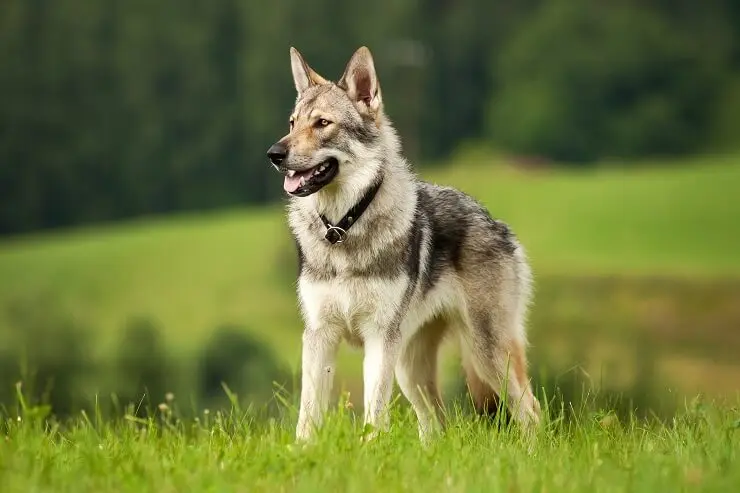
From Adobe Stock
Both German Shepherds and Wolves have very different personalities, so it can be difficult to predict what their mix will be like. But we will do our best below to explain some behaviors which should be expected.
Socialization and Family Compatibility
Wolves are pack animals, meaning they are very protective and loyal to their family – they will do anything to protect their kin. They are den-dwelling animals, meaning that your mix is likely to dig anywhere they want. It’s a good idea to allocate an area in your yard when they can make themselves comfortable.
You should know that the German Shepherd Wolf mix might act unpredictably around people, especially if they get scared. Sometimes, they might even get a bit aggressive. But, you can help them with this by introducing them to lots of different people and situations when they’re still puppies. It’s all about getting them used to being around others.
Also, these dogs are super curious – they love exploring! This means they might try to sneak out if they spot a chance. So, it’s a good idea to have a strong fence around your yard to keep them safe and secure. It’s all about making sure they have a safe space to play and explore without wandering off.
Behavior in Unfamiliar Situations
Wolves, since they’re wild animals, are pretty cautious around new places, people, and things they’ve never seen before. This shyness is something you’ll likely see in the German Shepherd Wolf Mix too. So, even though they might be really protective, don’t expect them to be the best guard dogs. They’re more likely to hide than to confront a stranger.
And here’s something else: this mix has a really strong instinct to chase, thanks to both sides of their family. German Shepherds were bred to herd animals, and wolves are natural hunters. So, your Wolfdog mix might find it hard to resist chasing after anything that moves, be it a squirrel in the backyard or a toy you throw. Just a heads-up if you have other pets or when you’re out and about!
Barking and Vocalization
They are also prone to howling as this is how they communicate in a pack. They will most likely howl when you leave them alone for too long, so it’s best to make sure you do not leave them for too long, otherwise your neighbors will soon complain.
Interestingly, your Wolfdog won’t show many Wolf-like behaviors until they are fully matured.
How to Train a German Shepherd Wolf Mix
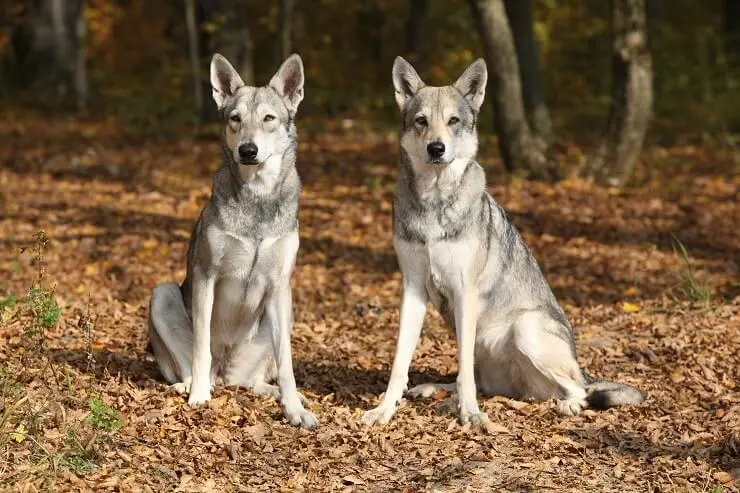
From Adobe Stock
Owning a German Shepherd Wolf Mix is not something you should take lightly, there are specific laws on owning Wolfdogs, so you should check your state regulations. This crossbreed needs an owner who is experienced in training difficult dogs that need lots of attention and care.
You will also need a large backyard which has very secure fencing. You should not own a Wolfdog in heavily populated areas, as they have a habit of howling a lot.
Training
It’s likely your hybrid will be intelligent, but if they favor the Wolf side of their heritage they will be stubborn. If they favor their German Shepherd parentage, they will be eager to please, so dog training will be easy. Either way, you should be training them with positive reinforcement. Give them rewards when they follow your command or when they stop unwanted behavior.
Many people believe that dominance training is the way forward with this dog as wolves are pack animals, but studies show that this training method leads to further aggression and reduces the quality of your relationship with your doggy friend.
This is a dog for someone who has experience training strong-willed dogs before – you need to be firm and consistent. Do not let them think they are the boss of you.
Socialization
Socializing a dog like this is very important as the wolf can be reserved and unpredictable. Make sure to socialize them with a range of people and different situations. Also, make sure they know it’s a positive experience by giving them encouragement and plenty of treats.
Caring for a German Shepherd Wolf Mix
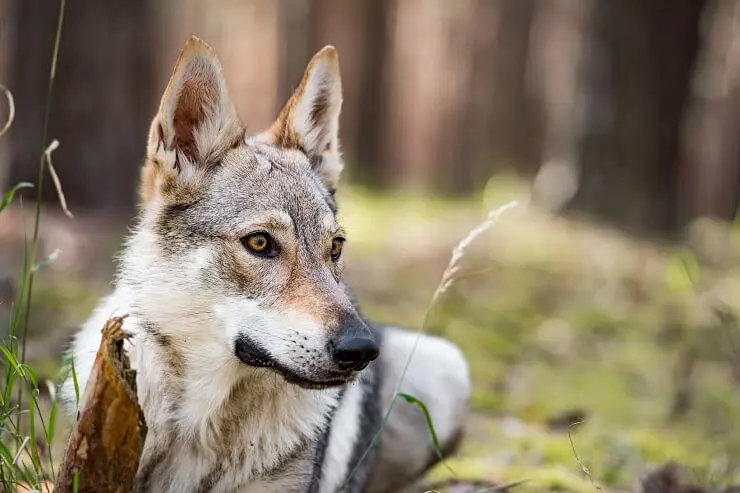
From Adobe Stock
This hybrid inherits characteristics from both the German Shepherd and the Wolf, meaning their care will be a blend of domestic dog requirements and considerations for their wilder traits. Regular grooming sessions provide an opportunity to check for any skin issues, parasites, or other health concerns. Let’s delve into the specifics of grooming this distinct breed.
Grooming
Coat Care
Twice a year, they go through shedding seasons where they lose a lot of their undercoat. This means you’ll need to brush them regularly, not just during these shedding times, but all year round. Brushing stops their fur from getting all tangled and matted. Plus, it’s great for their skin and coat because it spreads the oils around, keeping them looking nice and shiny.
It’s also super important to use the right tools for brushing. A de-shedding brush or rake is suitable, especially when they’re shedding a lot. It helps get all that loose fur out and keeps your furry friend comfortable.
Bathing
Bathing this mix should be done judiciously. Over-bathing can strip away the natural oils that keep their coat healthy and shiny, leading to dry skin and other issues. It’s advisable to bathe them only when necessary, using a mild dog shampoo. Always ensure they are completely dry after a bath, paying special attention during colder months to prevent them from getting cold.
Dental Care
You should try to brush their teeth once a week, at least. This regular brushing keeps their teeth healthy and helps prevent dental problems. If you start doing this when they’re young, they’ll get used to it and it’ll be much easier for both of you.
Nail Trimming
Regular nail trimming is essential to avoid overgrowth and splitting, which can be painful and lead to walking difficulties. Their nails should be checked and trimmed regularly, depending on their growth rate and activity level. If you’re not comfortable trimming their nails yourself, a professional groomer or veterinarian can assist.
Exercise
This is a very energetic dog, as wolves can travel up to 30 miles a day. They will need around 1-2 hours of exercise each day to keep fit and healthy. Not getting their exercise will result in them destroying your furniture and anything else they can bite.
It is also recommended to let them roam around in a fenced backyard, so they can play, dig and explore. You should not take your Wolfdog to dog parks and make sure to keep them on a leash and harness.
Mental Stimulation
Mental stimulation is very important if you do not want your Wolfdog to get bored and chew everything in sight. You can give them lots of toys and play with them, playtime can decrease their stress levels and make them more confident.
Feeding Guide for Your German Shepherd Wolf Mix
This hybrid, with its blend of domestic and wild canine traits, demands a diet that supports their high energy levels and overall health. It’s important to avoid dog foods that are high in carbohydrates and artificial ingredients. Instead, focusing on a meat-based diet that meets their specific nutritional needs is crucial. Let’s explore the various aspects of feeding guidelines for this breed.
Feeding Schedule
It’s a good idea to set up a regular feeding schedule for your German Shepherd Wolf mix. Eating at the same times every day helps keep their digestion on track and gives them a steady amount of energy. Puppies, because they’re growing, need to eat more often – like three or four times a day. But once they’re adults, two meals a day usually works well. The exact timing might change a bit depending on how old they are, how much they move around, and their overall health.
Portion Control
It’s really important to watch how much your German Shepherd Wolf Mix eats to prevent them from getting overweight, which can happen to many dogs. The amount of food they need depends on their size, age, how active they are, and how fast their body uses up the food. A good place to start is following the guidelines on the dog food package and then making changes if necessary. Checking their weight and body condition regularly will help you figure out if you need to feed them more or less to keep them at a healthy size.
Essential Nutrients
Making sure your German Shepherd Wolf Mix gets plenty of protein in their diet is really important. They need at least 50% of their diet to be protein to help their muscles and give them energy. So, foods like chicken, beef, lamb, and fish are great choices. But it’s not just protein they need; they also need a mix of fats, carbohydrates, vitamins, and minerals to stay healthy. Fats give them energy, carbs can help with fiber, and vitamins and minerals keep everything running smoothly, from their bones to their immune system.
Special Dietary Considerations
When considering a meat-based diet, research is key. While raw diets, like the BARF (Biologically Appropriate Raw Food) diet, can provide natural and nutritious meals, they come with risks, such as the potential transfer of bacteria. Consult a veterinarian or a canine nutritionist if necessary before choosing a specific diet. They can offer guidance on safely preparing and handling raw foods and ensuring the diet is nutritionally complete.
Treats and Snacks
Giving too many treats can make them gain weight and mess up their nutrition. So, it’s a good idea to pick treats that are low in calories but rich in nutrients. You can also use treats as rewards when you’re training them – it’s a great way to motivate them and reinforce good behavior. Just remember, moderation is the key to keeping them healthy and happy.
Hydration
They should always have clean water available to drink. How much water they need can change based on what they eat, how much they move around, and the weather. Hence, keeping an eye on how much they drink is a good idea because big changes might mean something’s up with their health.
Common Health Concerns for the German Shepherd Wolf Mix
Wolfdogs are generally healthy animals, but they are still prone to certain health issues, including the following.
If you’re like most dog parents (or parents-to-be), you care for your pet immensely. Having pet insurance could save you from the headache of going to the vets with reimbursement for every vet bill from now on!
Hip and Elbow Dysplasia
Hip and elbow dysplasia are common in large breeds, including the German Shepherd Wolf Mix. These conditions involve the malformation of the hip or elbow joint, leading to pain, lameness, and arthritis over time. Genetics plays a significant role in the development of these dysplasias. Symptoms can include difficulty rising, reluctance to run or jump, and a noticeable limp. Maintaining a healthy weight and providing regular, moderate exercise can help manage the symptoms. In severe cases, surgery may be required.
Degenerative Myelopathy
It usually shows up in older dogs and starts with them losing coordination in their back legs. In some cases, it can even lead to paralysis. Unfortunately, there’s no cure for this condition, but there are ways to help your dog have a good quality of life. Things like physical therapy, special devices to help them move, and extra care can make a difference. Catching it early is really important, so making regular trips to the vet is a must to spot it and take action in time.
Bloat (Gastric Dilatation-Volvulus)
Bloat, also known as gastric dilatation-volvulus (GDV), is a really serious condition that can happen to big dogs with deep chests, like the German Shepherd Wolf Mix. What happens is their stomach fills up with gas and then twists, which stops blood from flowing properly. Signs to watch out for are a swollen belly, drooling, restlessness, and trying to vomit but nothing comes out.
If you ever see these signs, you need to get your dog to the vet right away. To try to prevent it, you can feed them smaller meals more often and make sure they don’t do any intense exercise right after eating.
Allergies and Skin Conditions
This mix may inherit a predisposition to allergies and skin conditions, often seen in German Shepherds. These can be triggered by environmental factors, food, or parasites. Symptoms include itching, redness, and hair loss. Managing allergies involves identifying and avoiding triggers, which may require a process of elimination. Regular grooming and vet-recommended flea and tick preventatives can help mitigate these issues. In some cases, special diets or medication may be necessary to control symptoms.
Eye Problems
German Shepherds often have eye problems like cataracts and progressive retinal atrophy, and these can also happen to German Shepherd Wolf Mixes. To catch these issues early, it’s a good idea to take your dog for regular eye check-ups with the vet. If you notice signs like cloudy eyes, your dog being clumsy, or changes in their eye color, it’s worth getting them checked out.
Buying a German Shepherd Wolf Mix
If you believe this is the dog for you, and can fully commit to them, you should start researching where to buy a German Shepherd Wolf mix.
You can look for private breeders or adopt from rescue centers that specialize in Wolfdogs. Make sure you visit the breeder, meet them and ask them plenty of questions. Ask them what this hybrid breed is like, what is a typical day like living with a Wolfdog?
A breeder that is trustworthy and that cares for the welfare of their pups will want to know more about you. Many breeders and adoption centers will give you questionnaires to assess if they want to give you one of their pups. They do this because people adopt or buy a Wolfdog, not expecting how much work and effort you have to put into caring for them and then wind up taking them to a rescue center. No good breeder wants this for their pups.
FAQs on the German Shepherd Wolf Mix
How much does a German Shepherd Wolf Mix cost?
A German Shepherd Wolf mix will cost around $800.
How long does a German Shepherd Wolf Mix live?
A healthy German Shepherd Wolf Mix can live up to 14 years old.
Is a German Shepherd Wolf Mix a good family dog?
This is not a dog that should be living with small children. This dog should be kept by experienced keepers who are firm and disciplined with their pooch.
What is the temperament of a German Shepherd Wolf Mix?
German Shepherd Wolf Mixes can inherit a range of temperaments from both parent breeds. They are typically loyal and protective like German Shepherds, combined with the cautious and pack-oriented nature of wolves. This mix can be reserved or shy around strangers and may exhibit strong protective instincts towards their family. Early and consistent socialization is key to helping them become well-adjusted adults.
How much exercise does this breed require?
The German Shepherd Wolf Mix is a highly energetic and active breed, requiring significant daily exercise to stay healthy and happy. They thrive on activities like long walks, runs, hiking, and playtime in a secure area. Mental stimulation through training exercises and interactive toys is also essential to keep them engaged and prevent boredom-related behaviors.
What are the grooming needs for this breed?
This breed typically requires regular grooming due to their thick coat, which is prone to shedding, especially during shedding seasons. Regular brushing, at least a few times a week, helps to minimize shedding and keep their coat in good condition. Bathing should be done as needed, but not too frequently, to avoid stripping natural oils from their skin.
Are German Shepherd Wolf Mixes good with children?
Like any large and potentially powerful breed, the German Shepherd Wolf Mix should be supervised when around children. While they can be gentle and protective, their size and strength can inadvertently lead to injuries. Additionally, their mixed temperament might make them less predictable, so it’s important to teach children how to interact safely and respectfully with dogs.
Is it difficult to train a German Shepherd Wolf Mix?
Training a German Shepherd Wolf Mix can be challenging due to the independent and sometimes stubborn nature inherited from the wolf side. However, they are also intelligent and capable learners. Success in training this breed often comes from using consistent, positive reinforcement methods and starting training and socialization at a young age.
How do they behave with other pets?
The German Shepherd Wolf Mix’s behavior with other pets can vary. Their strong prey drive, inherited from both parent breeds, may make them prone to chasing smaller animals. Proper introductions and socialization are essential, and they may be more compatible with pets they’ve been raised with. However, caution should always be exercised, especially around smaller pets.
Reflecting on the German Shepherd Wolf Mix
This is a very unique hybrid, but is it for you? These dogs are energetic, playful, mischievous, and love to dig. They are also reserved and shy.
Training this mix is not impossible, but with their ‘wolfy’ stubbornness they will love to run circles around you unless you are a firm and consistent trainer. Further, early socialization is required for this shy hybrid, and it is not a breed for young children. However, they will love to play with older children, who know a dog’s boundaries.
More German Shepherd and Wolf Mixes
Want a German Shepherd Mix or Wolf Mix but aren’t keen on the German Shepherd Wolf Mix? Check out these other hybrid dog breeds:
German Shepherd Mixes
- German Shepherd Husky Mix
- Australian Shepherd German Shepherd Mix
- German Shepherd Poodle Mix
- German Shepherd Rottweiler Mix
- Border Collie German Shepherd Mix
- German Shepherd Boxer Mix
- Great Pyrenees German Shepherd Mix
- German Shepherd Beagle Mix
- German Shepherd Golden Retriever Mix
- German Shepherd Pitbull Mix
- Corgi German Shepherd Mix
- German Shepherd Lab Mix
- Golden Shepherd



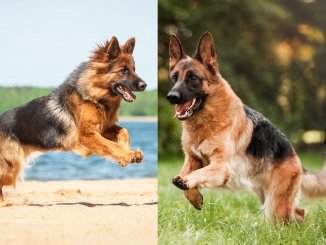


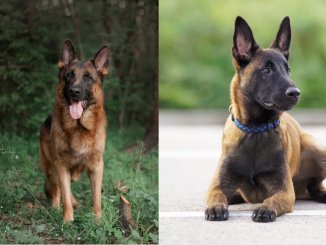


Looking for a mixed breed German Shepherd and Wolf pup
We are new to owning a wolf german shepherd and having allergy issues with him. We can’t seem to find the right foods to give him that won’t give him gasb it cause him to itch leading to bald spots because he’s biting that same spot. Any suggestions please. He’s on a flea regimen. But we want him to get the foods to fulfill both the Wolf and german shepherd in him. Help!
Raw fish heads, my GSD/wolf loved them.
Hi yrs n yrs ago I owned 2 80% timber wolves…
I have papers showing long time blood line…my grandmother mated a regular breeding wolf with her Shepard frequently n had papers ..
50’s n 60’s
In fact if I remember at 5 yrs…the police would borrow her dawg..?
Now the have n train their own..
Im curious if they are legal in mich…
And if not …what about Shepard mix…
I’d register as shepard…
Can you help me …
Let me know where to look an so on…still undecided…but would like sum info!!
Thank you so much!!!!